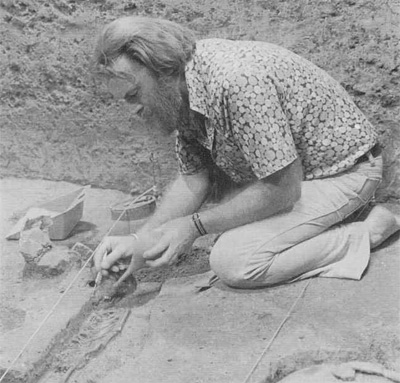 The tragic death of Chester Gorman just as he was completing the proof of one of the world’s great archaeological discoveries is a blow not only to his friends and colleagues at the University Museum in Philadelphia but to everyone in this field of research.
The tragic death of Chester Gorman just as he was completing the proof of one of the world’s great archaeological discoveries is a blow not only to his friends and colleagues at the University Museum in Philadelphia but to everyone in this field of research.
His excavations at Ban Chiang in Thailand have proved that Southeast Asia was one of the earliest centers for the development of basic techniques of civilized living and perhaps the region where men first discovered the methods of manufacturing metals. That discovery is altering many of our theories about the history of human activity and is now focusing a new interest upon the ancient history of the Far East.
A young American who worked in Thailand for many years, who spoke Thai fluently and who won the respect and affection of the Thai people, he was in a position to open up one of the most significant fields for future archaeological research to be found anywhere in the world. Moreover, his work there and his relation with Thai archaeologists are so well known to researchers in Malaysia, Burma, Vietnam and Laos that he was welcomed in these countries also, and had already arranged to expand this kind of research by Americans into the whole of Southeast Asia.
Chet began his Far Eastern research for the University of Hawaii, making his first notable discoveries at Spirit Cave and Non Nok Tha in Thailand. When the University of Pennsylvania’s University Museum recognized the probable significance of the site at Ban Chiang in Northeast Thailand, he was the obvious man to investigate it in collaboration with Charoenwongsa of the Thai Department of Fine Arts; also the man to take charge of the University Museum’s Southeast Asian Section.
The success of Chet’s collaboration with Pisit and all the other Thai diggers will soon be demonstrated by the Smithsonian Traveling Exhibit in America of the remarkable objects found at Ban Chiang. It will open in Philadelphia next year.
Chet’s integrity, kindness and understanding, and intelligence as distinct from cleverness or brilliance, are the qualities of the truly great humanist. These qualities spoke clearly to the Asians as well as to the Westerners. For all of us they have inspired a respect and affection that we will remember. A measure of the man was his determination to finish his life in Thailand among the people with whom he had worked for so many years. Tragically the disease from which he suffered overwhelmed him in California on his way to Bangkok.
His good friends on both sides of the Pacific will complete his work in the years to come but it will never be quite the same. Experience and knowledge acquired over the years are not truly transferable. And yet, there can be no doubt that his unique impact upon our knowledge of the ancient history of Southeast Asia will remain through the years as that history is unrolled by future diggers. There is a deep sadness for all of us that Chet could not live to see what the next generation will discover in this new look at the history of civilization in the Far East.
Froelich Rainey
